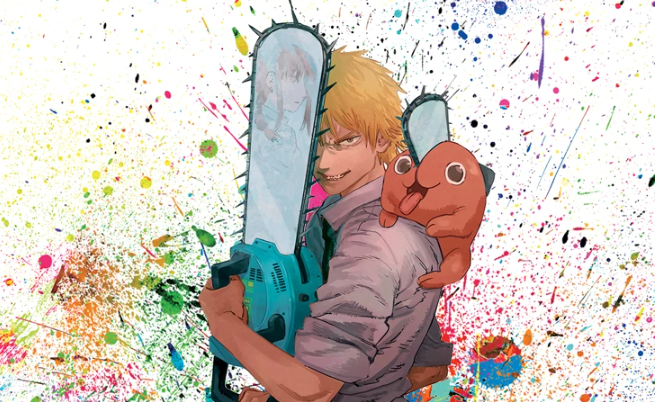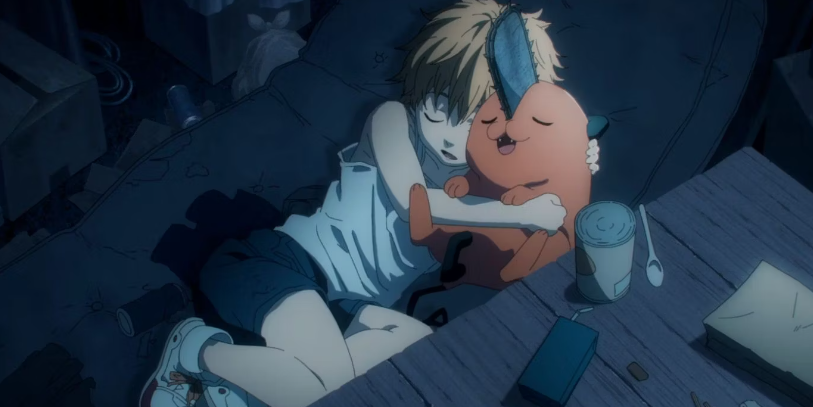In Defence of the Chainsaw Man Anime
Chainsaw Man has a strange fan base. When I wrote this review of the series last year, my focus was on the manga readers and how they negatively impacted the series’ reception among new fans to the anime. Ultimately, many Chainsaw Man readers are a bit drunk on their self-perceived intelligence and believe the manga to be a unique, ultra serious series in the vein of Berserk, Vagabond, Vinland Saga, and the other seinen that run ubiquitous in such circles. With this hubris comes the idea that Chainsaw Man is always dark, always deep, a “seinen dressed up as a shonen”. Then the anime came out, and it was animated with muted tones and treated to a cinematic art direction, and these same fans were disappointed with it.
I wrongly assumed in my last essay that most of the naysayers of the anime came from new fans, but as the months have progressed, the anime’s biggest detractors have come from longstanding manga readers. Their ire was mostly seen during the PV teaser and subsequent anime run of this year’s hype darling, Dandadan.
Written by former assistant to Fujimoto, Yukinobu Tatsu, Dandadan is a wacky, chaotic paranormal fantasy focused on the battles between aliens, ghosts, and the weird teenagers caught between them. At its centre is a heartfelt story about a nerdy outcast boy who falls in love with a kind beauty. The story is reminiscent of Mob Psycho 100, Cromartie High School, and Assassination Classroom – the comedy is loud and wild, the scenarios are inexplicable, and the darker moments are devastating, but the series never takes itself seriously, and one deep moment will suddenly slip away into an insane action sequence, to then round off with a quietly touching conclusion with our two protagonists. The series manages to pack in a lot of madness in each episode, and it’s a pacey, non-stop adventure. To reflect the story, the anime is bright, exciting, features extraordinary feats of animation, and boasts a contemporary, upbeat soundtrack that spans many genres. Chainsaw Man fans were disappointed because they imagined a similar direction for their own anime. And this confuses me.
It’s a good anime, by the way. Overhyped for sure but I’m impressed enough to give the manga another go.
Whilst I agree that Chainsaw Man isn’t this deep, dark, ultra serious manga, I don’t think it’s wacky or zany either. It’s absurd – not crazy, and there’s a technical difference between the two. Whilst Chainsaw Man has a lot of comedy and contends with the battles between garish devils and the humans that hunt them, the story is still quite grounded, and the stakes of the individual characters are high. In Chainsaw Man, people die permanent, devastating deaths, and the fights are explicitly violent and gory, and the heroes are morally grey and oftentimes the people we think we should trust in the beginning reveal themselves to be corrupt and self-serving. All the comedic moments are wrapped within the confines of a gritty, ominous setting, and they usually provide points of relief or an intentional tone shift in the narrative.
I don’t believe that Chainsaw Man is a romantic comedy, but Dandadan is. One example of difference is the relationship between Denji and Asa. There’s some obvious hints at young love between the two, but the story cannot develop in this direction because the outside events throw them from one disaster to another, and both are written as unconventional misanthropes, unable to properly articulate their feelings or understand social cues to interpret the emotions of others. During a touching speech in which Denji candidly admits his period of depression to encourage Asa in her sense of loneliness, Denji rounds off by asserting his desire to get laid and have a hot girlfriend. But he is sincere and deadpan with this delivery – it's both funny and pitiful.
I have my own criticisms of Chainsaw Man, and that relates to the constant conveyer belt of trauma that Denji is put through, to the point where they now lack emotional impact. He gets sexually assaulted and abused so often that the nature of this abuse becomes meaningless. Immediately after an ordeal, a chapter will pivot to a character fondling or kissing Denji without his consent, or at least trying to. After an exhausting action sequence where Denji has been subjected to many bouts of near-death, the chapter will end with a sudden act of violence against Denji – or the death of someone he cares about. Such scenarios would not fit in Dandadan’s world, which is tonally light-hearted and sympathetic towards its characters – at least from what the anime has covered so far. I have no idea why Chainsaw Man fans expected a Dandadan-style adaptation. It would annoy me.
Like Denji’s whole story is so sad. He’s nothing like Okarun, and the telling of his backstory is completely different from the main Dandadan cast so far.
I feel the differences between the two series especially in the midst of Part 2: Chainsaw Man is now in a school setting, but the narrative is highly interior: Asa lives a lonely, isolated experience in her apartment and is shunned by her school friends, and we follow her alienated existence which slowly expands to incorporate other outcasts. Likewise, Denji lives with Nayuta, but the pair navigates a tight-knit, mutually dependent partnership away from society. When Denji walks the school halls, he doesn’t interact with other students and we don’t see how he relates to his classmates. Instead he is plagued by Yoshida from public safety and a host of devils, and even when Denji’s status as Chainsaw Man becomes important to the wider student populace, it’s revealed that many of these apparent students are connected to Public Safety and the devils anyway – every other normal person is quickly discarded or shunned from the narrative. It makes for a claustrophobic setting where Denji is trapped by his hybrid nature and is still forced to work alongside a dubious organisation that has him virtually imprisoned to a role he never chose for himself.
Dandadan is markedly different: we are introduced to teachers and constantly see the main characters interact with their classmates, we understand the roles the protagonists play in their respective schools: Okarun as the nerdy Otaku that everyone ignores, Momo the aloof cool girl with a gaggle of offbeat, loyal friends, Aira the school’s sweetheart – and as their friendships deepen, they acquire many more friends that possess equal importance to the stakes and the story. It's a classic found family setup. No one is there begrudgingly, or forced together by the threat of execution, or bonded through trauma like they are in Chainsaw Man. Ultimately, Chainsaw Man is a much quieter series than Dandadan, and I think the anime adapted this tone accurately.
What I gather from Chainsaw Man fans is that I will never understand them, and they all have strange interpretations of their series. Some of these interpretations come from speed reading and not properly digesting the story, others stem from that hubristic pretentiousness mentioned earlier, and many more is due to personal preference and taste. People emphasise the parts of the series that resonate with them the most – for some, this will be the tragedy, for others, the moral greyness, and for the rest, the comedy, and this latter aspect is what drove the expectations among manga readers that the Chainsaw Man anime would be loud, wild, colourful, and chaotic instead of quiet, cinematic, and gritty. Personally, I enjoyed the adaptation. I’m a bit sad to be in the minority on this.


